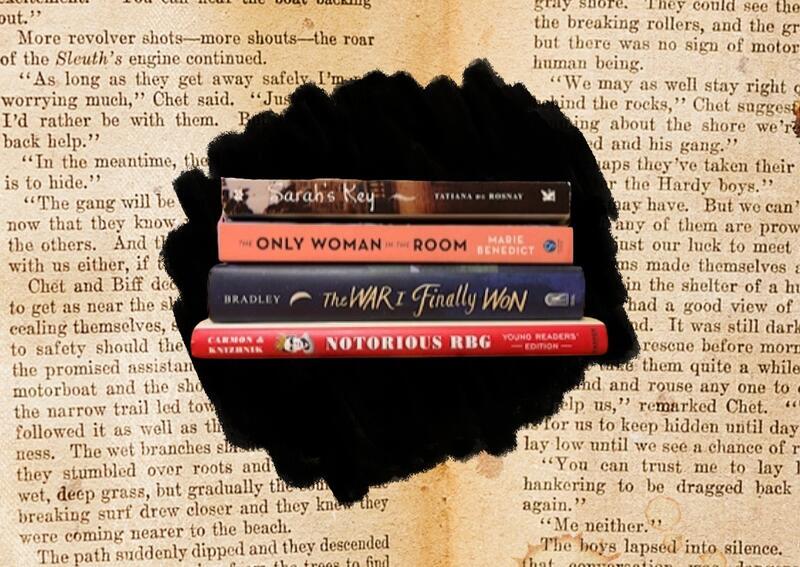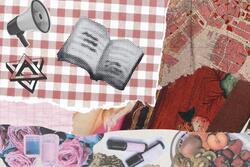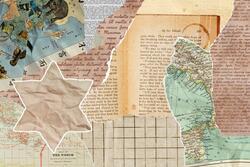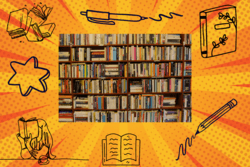Understanding My Identity Through Books
A few days before my bat mitzvah, I stood on the bimah, practicing reading my d’var Torah to a mostly empty synagogue. My parents and my rabbi sat in front of me as I read from the essay I’d labored over about my Torah portion, listening intently.
My first mistake came just a few paragraphs in. “Later, in a vision, God tells Abram that he will have a child and heir,” I said, pronouncing “heir” as “hair.” How was I, who had spent thirteen years reading books silently, supposed to know about the silent “h"?
For all that I’ve learned from reading, it feels like every few months, I discover a new word I’m pronouncing incorrectly. Although I may have read these words dozens of times in my books, I may have never heard them spoken aloud. I’ve been reading my entire life, devouring books left and right, but I have found that I often need to bring what I’ve learned on the page to the world around me to truly understand the full meaning of these books. Reading has not only expanded my vocabulary, but has introduced me to concepts, stories, and pathways that have helped me make sense of history, the world around me, and my own identity.
Reading about Jewish women through history, real and fictional, has been transformative. Without reading about Jewish women, I would not have started exploring my own identity as a Jewish feminist at such a young age.
In fifth grade, I was given a copy of the young reader’s edition of Notorious RBG: The Life and Times of Ruth Bader Ginsburg, by Irin Carmon & Shana Knizhnik. I read that book over and over, eager to learn about this fearless woman who defended our rights and created change. Inspired by Ruth Bader Ginsburg, I joined my middle school’s feminist union, and later on in high school, I joined my school’s Amnesty International chapter. Books have always been a pathway for me in learning about ways I can take action on issues that matter to me.
Shortly after reading about the notorious RBG, I read The War I Finally Won after stumbling across Kimberly Brubaker Bradley’s books at my local library. The War I Finally Won is a middle-grade historical fiction novel set during the Second World War. It is the sequel to The War that Saved My Life, a 2016 Newbery Honor Book, in which an eleven-year-old girl named Ada and her younger brother Jaime are sent to live with a woman named Susan during the London Blitz bombings, when the city’s children were evacuated to the countryside.
In The War I Finally Won, a sixteen-year-old Jewish girl named Ruth flees to England from Nazi Germany. Since she’s German, many people in the rural English town are wary of her, thinking she could be a German spy. The fact that being Jewish wasn’t enough to convince some people of her innocence was shocking to me when I read it, but it also helped me understand the complexity that comes hand in hand with multifaceted identities.
In The War I Finally Won, many people are terrified of Ruth because of their ever-present fear of German spies. They ostracize her and are cruel and unwelcoming. While their fears of the Nazis are legitimate, they are unable to see Ruth as the young girl who fled the Nazis, the Jew trying to find a safe place. Instead, they only see the danger of the enemy. The enemy that, as it turns out, Ruth also fears. People have trouble seeing how her German and Jewish identities could coexist. Reading about this helped me understand that identity is often much more complex than it seems and that different parts of one's identity can exist alongside each other. Acceptance of that leads to learning and understanding.
Four years ago, for my bat mitzvah, my great-aunt gave me a copy of Sarah’s Key by Tatiana DeRosnay. It is the story of Julia Jarmond, a present-day journalist investigating the often-forgotten atrocities of the Vel' d'Hiv roundup of French Jews in Paris, and of ten-year-old Sarah Starzynski, a Jewish girl in Paris in 1942. It is intense, a brutal yet beautiful telling of a sliver of the Holocaust that normally escapes notice. The dual timeline format of the book makes those events of the past feel closer by showing the present-day narrator’s discovery of an obscure but poignant historical event. While reading about the Holocaust wasn’t new for me, the book showed me ways that literature can connect the past and the present. As an aspiring journalist, I was drawn to Julia Jarmond’s persistence in finding out what happened to Sarah, and middle school me understood the wartime narrative more powerfully as it was told from Sarah’s perspective.
Just last year, my great-aunt gave me another book - a copy of The Only Woman in the Room by Marie Benedict. The novel is about the Jewish inventor and actress Hedy Lamarr, and her marriage to a dangerous Austrian arms dealer during the 1930s. Reading about Hedy Lamarr’s strength, courage, and wit inspired me to do more research into her life and her accomplishments. Before picking up the book, I knew she’d been an actress but didn’t know much at all about the frequency hopping technology she developed during World War Two. Although my aunt and I are generations apart, a love of historical fiction and reading about strong Jewish women through history has connected us.
I’ve spent my life exploring the world through stories, which has only strengthened my understanding of my own Jewish and feminist identities. Every day I find new books to read, and I know that they will continue to help expand my understanding of my own identity, and of the world around me.
This piece was written as part of JWA’s Rising Voices Fellowship.







